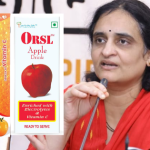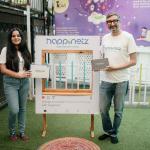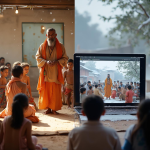Few embody wellness as intentionally as Luke Coutinho. His integrative approach – rooted in ancient wisdom and modern science – has transformed lives through nutrition, movement, and emotional healing. Luke lives the wellness he teaches, using his Bharat School Menu and Lifestyle Plan to redefine how India nurtures its children.
Table of contents [Show]
Myth of “Healthy” Food
We’ve replaced khichdi with corn syrup-laced cereal and confused marketing with nourishment. Luke’s Instagram shows that wellness lives in our everyday kitchens – in banana stem juice, jaggery, soaked nuts, moringa.
“We’ve made food too complicated,” he says. True nourishment isn’t expensive. It’s local. It’s seasonal. And it’s emotional.
The Bharat School Menu celebrates staples like dal, poha, millet rotis, seed chutneys, and fermented vegetables, challenging the belief that “fortified” or “child-friendly” packaged foods are superior. Luke’s plan is “about emotional and lifestyle balance, not just what’s on the plate” – it places the child at the heart of a national health movement.
The Bento Box of Our Future
In a country where “wellness” is often co-opted by privilege, Luke brings it back to the children. “Today’s lifestyle diseases are beginning in childhood. We’ve seen hormonal issues, obesity, and gut-related conditions in children as young as seven. It’s not about fear — it’s about awareness.” He debunks the myth that “healthy food has to be expensive or exotic. Powerful foods are already in our kitchens — millets, pulses, seasonal greens, nuts, seeds, and fermented foods.” Think of it as India’s bento box: simple, balanced, and rooted in local wisdom. Nourishing a child is no longer just parenting – it’s matter of national health policy, demanding curriculum changes, ingredient regulation, and lifestyle education in schools. A conscious rejection of quick-fix, instant-gratification hacks in favour of sustained, deliberate cultivation of health.
Dismantling Food Myths
Mapabear: What’s the biggest misconception around school nutrition today?
Luke: The biggest misconception is that nutrition for children is about calories or packaged “fortified” foods. It isn’t. True nutrition is about nourishing the body, the gut, and the mind with real, local, seasonal food. There’s also this belief that healthy food is expensive, a hassle, or complicated. It isn’t. Some of our best results come from the simplest of diets — the kind that generations before us ate without fancy labels or superfoods. Another common myth is that getting children to eat healthy is difficult. It really isn’t. We often complicate it as adults. Children observe and mirror us — if we practise balanced eating with joy, they are far more likely to follow. We have to model the behaviours we wish to see, not just preach them.
Coutinho champions food integrity. He calls for stricter ingredient testing—many packaged “health” foods contain hidden toxins, heavy metals, and adulterants often masked by misleading labels. He believes holistic health goes beyond the ‘natural’ or ‘healthy’ buzzwords on the packaging. Even a home-cooked meal can harm if its ingredients are compromised, he warns.
From Gut to Government
The Bharat School Menu and Lifestyle Plan was born from rising childhood disorders: “obesity, insulin resistance, gut issues, poor immunity, attention disorders.” The solution? “Prevention begins early.”
A pivotal meeting with Prime Minister Modi brought Luke’s vision into national alignment. “The Prime Minister’s call for a healthier Bharat resonated deeply with our work,” he says. This isn’t just a dietary framework; it is, in Coutinho’s words, “our way of offering every child in this country — from any background — access to simple, local, balanced nutrition and better lifestyle habits.” It is a potent declaration, underscoring the critical window India now faces in arresting the tide of lifestyle-driven ailments at their very inception. He foresees this as “the right time because if we act now, we can change the trajectory of an entire generation’s health.”
“Our Prime Minister has always emphasised going local and building healthier lifestyles from the ground up. This perfectly aligns with the philosophy we practice in integrative wellness: using what is native to us — our foods, our wisdom, our movement, our culture — to build resilience and well-being.” Furthermore, this initiative stands as an organic extension of Prime Minister Modi’s ambitious “Fit India” vision, far more than a policy but symbolic of national awakening at grassroots. “We see the Bharat Nutrition and Lifestyle Classroom, the Bharat School Menu and Lifestyle Plan, and the Bharat Dish and Lifestyle Plan extensions of that — taking health awareness right into our children’s lives, homes, and classrooms.” This strategy aims to embed wellness into every child’s daily life.
Beyond the Plate
The meeting with Prime Minister Modi gave Luke something more than a mission, a mandate. Mr. Modi said, “the best way to improve the health of our country is to focus on kids, our future generation.” This laid the seeds for The Bharat School Menu and Lifestyle Plan; an open-source, monthly framework available to Indian schools and homes for free, containing menus, wellness practices, and lifestyle shifts. The beauty of this initiative is that it’s rooted in local wisdom. It does not rely on imported ideas. “Rural India already has a rich tradition of seasonal, indigenous foods — our role is to preserve and honour that. In urban areas, we often need to undo misconceptions created by marketing and processed food culture. That’s why the Bharat School Menu and Lifestyle Plan is simple, flexible, and adaptable — it meets children and families where they are, whether in a city apartment or a village school.”
Coutinho emphasizes with gravitas that wellness goes beyond food to how “a child moves, sleeps, handles emotions, and connects with their food matters just as much.” This comprehensive, integrated approach is pivotal to cultivating sustainable, grassroots-level transformation, with simple, doable lifestyle actions. “From screen time awareness to mindful eating, gratitude practices, sleep hygiene — when we embed these habits early, they create lifelong resilience. And because this is a free, open initiative, it can scale naturally across communities and geographies.”
“Emotional and mental well-being are absolutely integral to this initiative. We can’t separate the plate from the mind, or movement from emotional balance.” The goal, Luke says is to “teach practices like mindful eating, gratitude, simple breathwork, sleep hygiene, and screen-time awareness. Children learn what to eat, and how to manage emotions, stress, and digital habits. It’s these small lifestyle behaviours that build resilience — physically and emotionally.” Feeding children right isn’t hard—unlearning adult habits is. Scaling this non-commercial initiative posits unique challenges. The challenge, he notes, is resisting the urge to overcomplicate a simple solution. It isn’t a one-size-fits-all solution – India’s diversity demands flexibility.
To make healthy lifestyle no longer a choice, but a condition, Bharat School Menu and Lifestyle Plans is open-source and freely available on his website — accessible to all.
A Nutritionist, A Nurturer
Luke’s expertise is both scientific and personal. As a father, he’s quick to admit that real-life parenting reshaped his philosophy.
Mapabear: How has parenting changed your view on wellness?
Luke: Parenting teaches you humility — and practicality. You realise that preaching doesn’t work — modelling behaviour does. We can’t aim for perfection with children, but we can help them build an intuitive relationship with food, movement, rest, and emotional health — it’s about real life, not ideal life.
“Children don’t need perfect parents. They need present ones.” This principle underpins the entire Bharat initiative: model wellness, but do not mandate it. “Let’s teach kids to listen to their bodies. To eat with joy, not judgment.”
In rural India, the plan’s mandate is to “preserve and honour” the rich seasonal, indigenous foods. Conversely, within bustling urban centres, the challenge lies in deconstructing “misconceptions created by marketing and processed food culture.” The plan’s intrinsic “simple, flexible, and adaptable” character ensures it adeptly meets “children and families where they are, whether in a city apartment or a village school.” “One of the worst lessons we pass on is that food is a reward or that sugar is love,” he says.
Scaling Simplicity
Wellness isn’t a reset— it’s a way of life. The Bharat Lifestyle Plan reflects this belief. It includes breathwork, gratitude, screen curfews, and movement routines based on age. Wellness isn’t a checklist – it’s a culture. And the plate is just the entry point.
In his recent Instagram post, he said, “Healing is not just what you eat, but what you stop eating also.” On Instagram, you’ll spot Luke barefoot in a field harvesting seasonal greens and the next day, breaking down sleep hygiene for a child with ADHD. “Integrative wellness uses what is native to us — our foods, our wisdom, our movement, our culture — to build resilience and well-being.” That means replacing vitamin gummies with amla, screen-time rules with gratitude rituals, and cafeteria sodas with matka water.
The Bharat Plan evolves through monthly feedback from schools and families—making it responsive, child-friendly, and practical. The Bharat plan translates that wisdom into child-friendly, school-compatible action. The plan complements the Fit India Movement through an integrative lifestyle lens. Now, the plan is not just reshaping tiffin — it’s shaping school culture.
One of the initiative’s strengths is its scalability without dilution. “Food alone isn’t enough. How a child moves, sleeps, handles emotions, and connects with their food matters just as much. That’s why we’ve designed this initiative with simple, doable lifestyle actions. From screen time awareness to mindful eating, gratitude practices, and sleep hygiene — when we embed these habits early, they create lifelong resilience. And because this is a free, open initiative, it can scale naturally across communities and geographies.” It’s not a fixed system. It’s a living one, and culture shift begins with small actions. The monthly menus and practices evolve with feedback. Children’s preferences and teacher insights shape each iteration.
Breaking Generational Myths
Luke’s most powerful messages are also his simplest:
Myth: Kids will grow out of bad food habits.
Truth: Lifestyle disorders now start in childhood. Early patterns matter.
Myth: A little junk is fine if they’re active.
Truth: Processed foods affect gut health, mood, and hormone balance — even in active kids.
Myth: Children are naturally fussy.
Truth: We’ve overexposed their palates to salt, sugar, and artificial flavour. They weren’t born fussy. We conditioned them.
Luke calls for emotional nutrition — addressing how stress, family dynamics, and guilt affect a child’s well-being.
As India sprints into a digital-first future, Luke Coutinho is calling for an analogue wisdom: breath, balance, boundaries. For him, wellness is never just “a one-time diet or class. It’s how a child sleeps, eats, moves, and thinks every day.” This foundational shift, he explains, is precisely what the Bharat Nutrition and Lifestyle initiative champions. It's “about integrating wellness into daily life so deeply, it becomes second nature. Not forced — but familiar.” Ultimately, it is this seamless adoption of holistic habits that underpins his grand vision: “These small wins build strong children. And strong children build strong nations.”
Dear Mommas and Dadas, You Don’t Have to be Perfect. Just Present.
Luke’s answer is quietly radical when asked what he most wants parents to know; “Start with one habit. Teach your child how to eat one colourful plate. Or to breathe before a meal. Or to sleep without screens. Practice what you preach to your kids; it starts from there.” In doing this, you gift your children the most treasured asset of wellness. In the end, it’s not just what’s on the plate — it’s how we teach our children to relate to it. The child, the plate, and the nation rise together.





 Guiding and Empowering Parents with fact-checked excellence -
Guiding and Empowering Parents with fact-checked excellence -